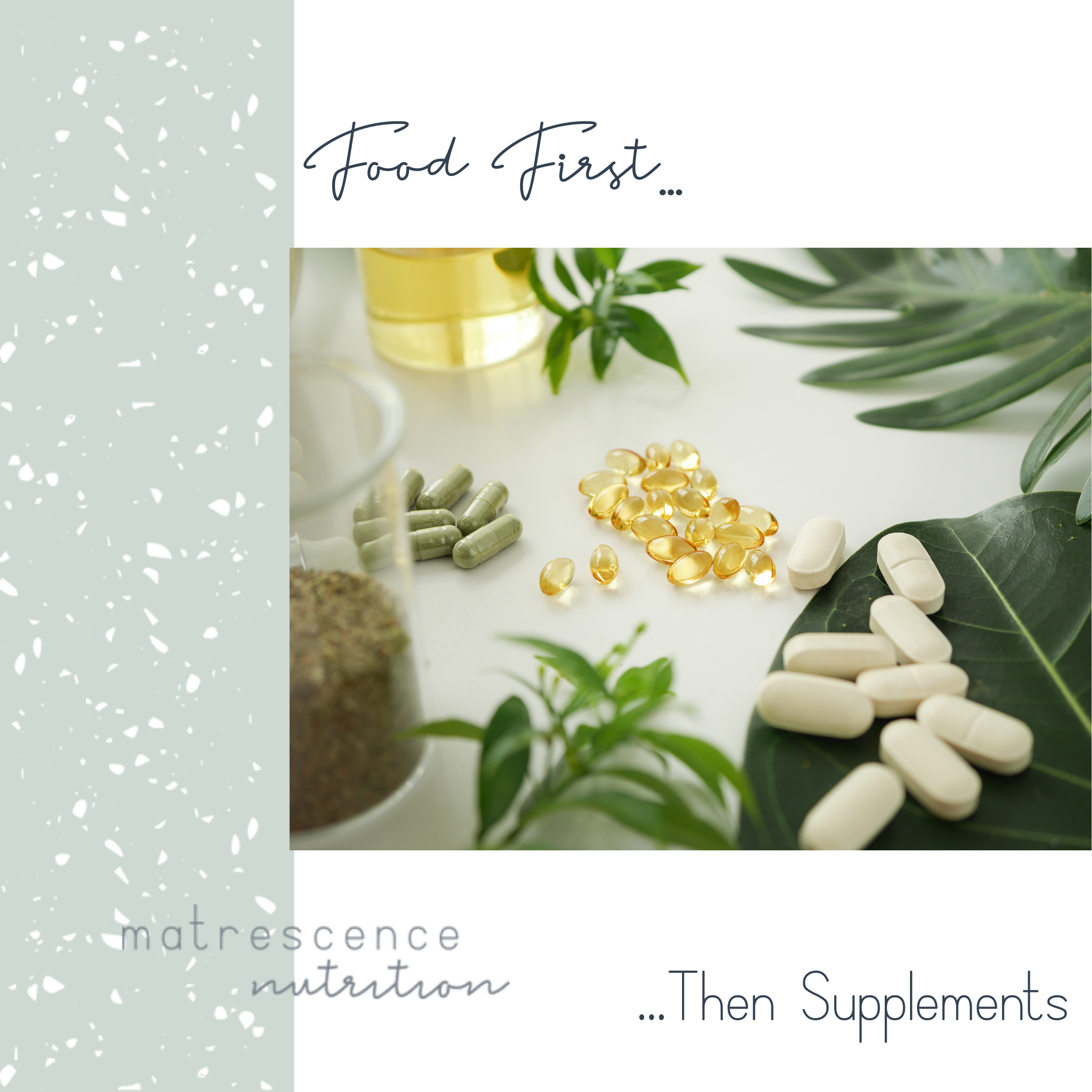Food First, then Supplements
I get it. It’s appealing to think that you can just take a prenatal or some other supplement and be good to go. Who wouldn’t want to be able to pop a few pills and then focus on basically anything/everything else knowing nutrition was completely taken care of? Yea, me too. And I get so many clients who seem to think that I’m holding out some miracle supplement or silver bullet that will just solve all their problems. Unfortunately, that’s just not the way it works. Believe me, so many days I wish it did! Good news is, Mother Nature is pretty stellar at offering us all we need, if we know how to look (and I can help you with that!). But, sometimes, supplements can help bridge the gaps or offer us a nice safety net, especially in critical times like trying to conceive and pregnancy!
FOOD FIRST
You’ve probably heard the saying, “abs are made in the kitchen”, or “you can’t out-train a poor diet”. These point to the significance of nutrition in your aesthetic goals. Well, I can also tell you that you can’t out-supplement a poor diet or lifestyle. By that, I mean, that if you’re not eating well, no amount of supplements is going to overcome that deficit you’re putting yourself in.
Why is food best? For a number of reasons. First, the vitamins and minerals in real, whole foods are more bioavailable. This means your body is more capable of absorbing and using these forms of the nutrients. Which makes sense, right? Your body was designed to use food (as medicine, as fuel, etc.) to meet its needs, so it stands to reason that your body is going to be best at using food for nutrients. Food is also non-toxic. Some vitamins/supplements can increase your toxic burden thanks to heavy metals, processing, etc. And finally, the other really big reason food should be the first approach to meeting your needs is that food tends to have the proper ratios and synergy of nutrients. For example, vitamin D is a called a fat soluble vitamin. This means that it is only really absorbed in the presence of fat. So, if you’re drinking skim milk and thinking you’re getting your vitamin D...you’re wrong. No fat = no absorption. And if vitamin D isn’t getting absorbed, neither is calcium, as it depends on vitamin D for its absorption. But, whole milk? That’s got fat, protein, vitamin D, vitamin A, and calcium. Iron is another great example. Iron in supplement form often causes constipation and other digestive symptoms and isn’t absorbed well. In food form? No digestive issues and readily absorbed, especially if coming from animal based sources.
WHEN TO SUPPLEMENT
So, when DO you want to supplement and why? Well, the truth is, despite food being the best source of nutrients, thanks to less sustainable farming practices, soil depletion, less than ideal harvest timing and more, the food we eat today just isn’t as nutrient-dense as the food previous generations consumed. So, even if you’re eating an amazingly stellar diet, it’s likely that the nutrients are just lower than you’d want or expect. Additionally, our toxic burden tends to be much higher these days. From air pollution to run off into water, mold toxicity and stress, our bodies are dealing with.... a LOT. And more stress = more nutrients used = more nutrients needed to simply keep the ship afloat. Supplementing can help bridge the gaps in the diet, support a stressed system, make up deficits from different lifestyle burdens, etc. And in pregnancy/trying to conceive, supplementing can serve as a “backup” to ensure mom and baby are both getting what they need without any sacrificing.
WHAT TO CONSIDER
If you’re going to spend money on supplements, make sure you’re spending money on QUALITY supplements. Otherwise, you’re literally just throwing your money away. Quality totally matters. With a few exceptions, supplements in your local CVS are unlikely to be worth spending money on. Because I believe so strongly that everyone deserves to have access to high quality supplements, I actually provide my clients with supplements at cost. What this means is that as a healthcare provider, I’m able to access an entire “warehouse” of supplements that are super high quality and generally not available to the individual without going through a provider (or cost a ton!). Some practitioners will purchase the supplements they like using for clients and then mark them up to make some profit off of supplements. While I get this, I chose not to do it. In other words, whatever I pay for the supplement (typically around 50% of the retail price), you pay. I simply have clients pay what I paid for the supplement so that I “break even”. It’s just one little “bonus” I offer my clients. ;)
Beyond just quality, types of vitamins and minerals are important to consider, too. For example, if you have certain genetic mutations like MTHFR, the form of folate you use is really important. The synthetic form, folic acid, should generally be avoided, while the natural form (folate) is encouraged, or even methylated folate. For a mineral like magnesium, some forms are better absorbed than others. Magnesium citrate is often used to help with constipation (BECAUSE it’s not absorbed well, so it helps encourage stooling), but if you need more magnesium IN your system, this isn’t a good form to choose. These are just two examples, but the point is, it’s not as simple as just grabbing “magnesium” off the shelf.
WHAT TO SUPPLEMENT
Ok, so, you’re trying to conceive, you’ve gotten your diet under control, you’re working on lifestyle factors, your cycle is nice and regular, etc. Now what? What supplements are you really going to want to include? There are a few I recommend for EVERYONE. First, a good prenatal for the woman AND a good multivitamin for the man (remember, it take 2 to tango!). Both partners should also do a good fish oil, unless you’re eating fish 3+ times a week. And, I often recommend a probiotic if you’re not eating fermented foods basically daily.
A good prenatal should have choline, active form of vitamin A, folate, vitamin D3, selenium, and iodine (as well as lots of other things, but definitely these guys!). For a multivitamin, you’re looking for most of the same things, as well as zinc, higher vitamin C, vitamin E. Fish oil, I like a good mix of DHA and EPA, with a dose of at least 1,000mg/day. Vitamin D often needs an additional supplement, as I generally recommend at least 4,000 IU/day and I’ve only found maybe one prenatal with that amount! Probiotic...I like a women’s blend of some sort with some good Lactobacillus and Bifidobacteria strains.
For vegans/vegetarians, the considerations are a bit different. Glycine, choline, DHA, B12, and protein are all more likely to be low, as well as iron. So it’s really, really important to work with a good dietitian to help ensure you and baby are getting what you need. Other supplements are often used to help regulate cycle, etc., but totally depends on what I’m seeing in the client. Remember, it’s not a “one size fits all” approach to a care plan, or to supplementation!
IN SUMMARY
So, fertility...so much to consider! It starts with a healthy cycle and healthy egg and sperm. To get a healthy egg and sperm, nutrition first, lifestyle second, supplement third. I know, it’s a lot! And it doesn’t happen overnight. And your journey is going to look different than someone else’s! Ready to get started? Ready to be supported? Let me be part of your journey.



